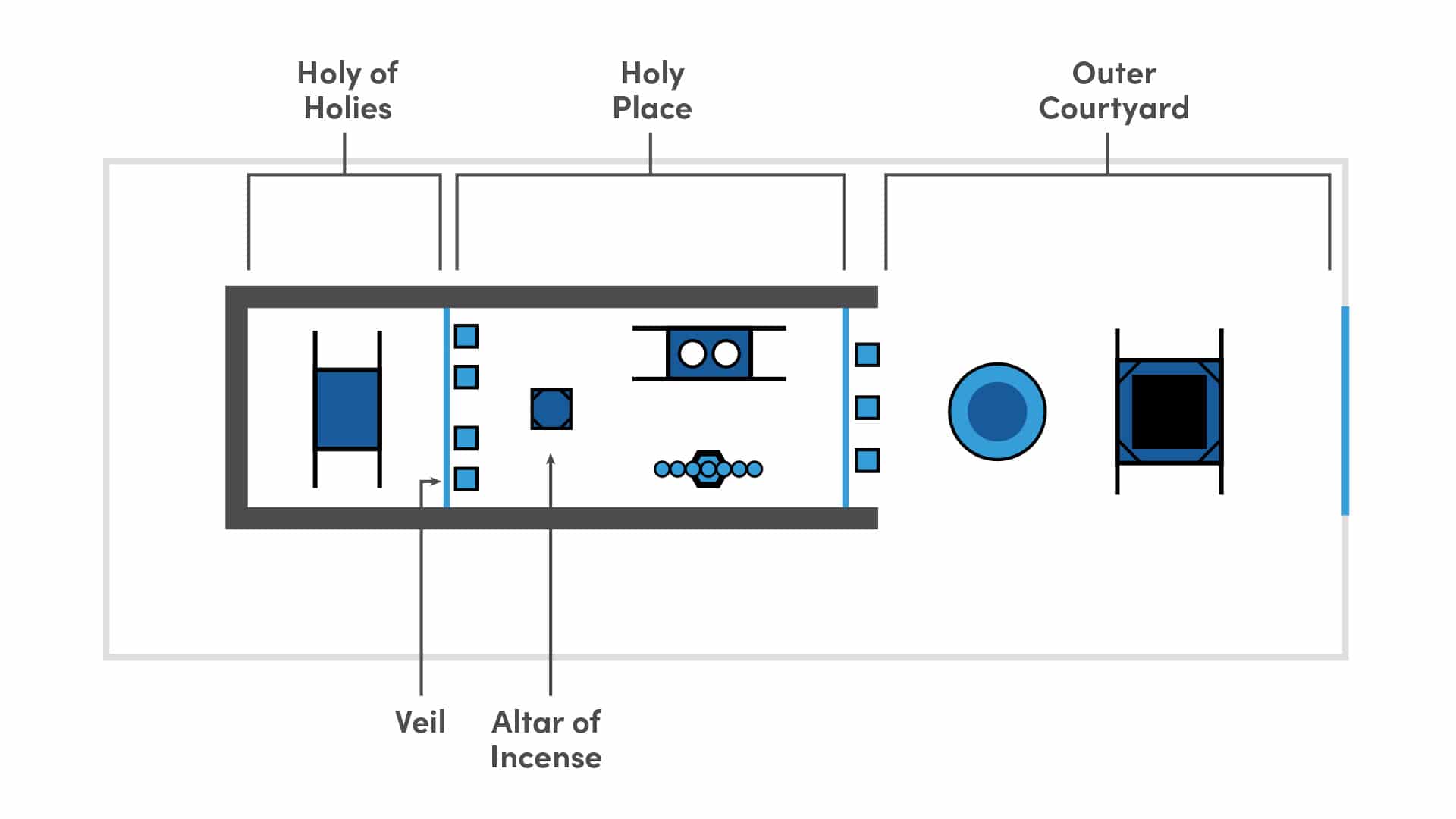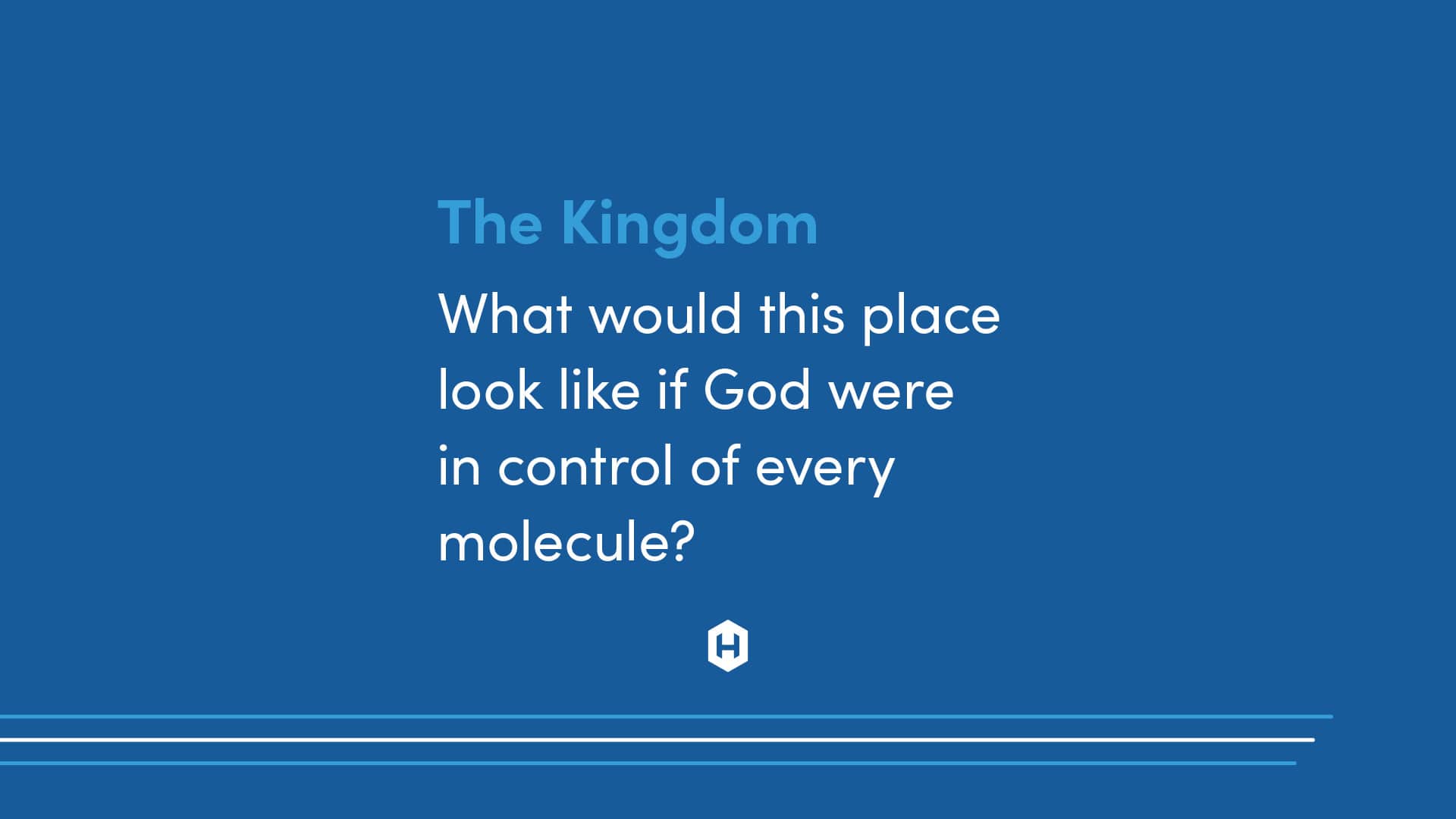This message was delivered at Harpeth Christian Church on December 5, 2021, as the first sermon in their Advent series. You can read, watch, or listen to the message from this page.
The “kingdom of God” can be hard to understand and define. So let me share with you a story about the kingdom to help with that challenge before we jump into Luke 1:5–38.
The kingdom of God is like the man who lost his job just before Christmas one year. It happened suddenly, and he didn’t know how to tell his wife of ten years, let alone their three young kids.
Money was already tight, and losing his job put a pit in his stomach. His greatest desire in life was to be successful, and this had been derailed.
So he kept it a secret. For three week he left his house as if going to work but instead applied for jobs.
But for one reason or another, no one offered him a job in his field. He was totally deflated and devastated, and he started to drink alcohol—every night.
One drink a night became two, then three, and quickly he had a drinking problem on his hands.
He thought he had kept his job loss a secret, but on Christmas Eve his wife came to him after the kids were in bed and said,
“I know what happened, and it’s okay.”
He wept that night in front of his wife for the first time in their marriage. He was broken.
Christmas morning came sooner than usual for him. At 4:00 a.m., before anyone else was up, he was wide awake. So he got out of bed, knelt down, and prayed the most honest prayer he had prayed in a while.
“God, I’ve put my hope in my career and what I can accomplish. I’m sorry for not trusting you. Will you give me another chance?”
He felt the Spirit say:
“Trust me with your life, and I’ll take care of your job.”
All Christmas Day, he couldn’t stop thinking about what he’d heard from God. The truth is, he’d never really been the kind of guy to “hear from God,” but the impression he’d received in prayer was indelible.
God was cultivating faith in him.

The next day came without a job. New Year’s Day came, and still no job. He was tempted to be afraid and go back into despair, but he remembered what he’d heard from God.
So while he kept pursuing work, his life started to change: He began praying with his wife, reading Scripture with his kids for the first time ever, and what he had once filled with alcohol was now filled with the Spirit.
He had used alcohol to mask his longings, but now he wanted what God was doing in his life more than he wanted to drink.
It was the middle of February before he got the phone call that quickly led to a job. It was perfect timing because they didn’t know how they were going to pay the next month’s bills.
He took the job, but instead of putting his hope in it, he now believed that nothing could fill the void left in his life that only the kingdom of God can—not a job, not alcohol—nothing other than God himself.
His life was truly better: He felt connected with his wife when they witnessed answers to prayers they had prayed together. He felt joy seeing his kids grow in their knowledge of the Lord. He felt a deep and abiding peace because he had nothing to hide anymore.
He had once only wanted worldly success, but instead he found what he really longed for—God. He went from being distant from God to seeking the kingdom of God.
Our Longings at Christmastime
As we approach Christmastime, many of us are looking for change.
This year has been hard. Some have experienced the loss of a loved one, some have lost their job, or are in one way or another still feeling the effects of the pandemic.
So we come to God with our situations in life, and sometimes they can be valid surface-level desires, but I invite you to go a little deeper with God this season.
My overarching theme today is this:
Jesus’ kingdom fulfills our deepest longings. Will you trust him?
Let’s look at the coming kingdom of Christ in Luke 1:5–38.
Zechariah’s Longing for a Son
In the time of Herod king of Judea there was a priest named Zechariah, who belonged to the priestly division of Abijah; his wife Elizabeth was also a descendant of Aaron. Both of them were upright in the sight of God, observing all the Lord’s commandments and regulations blamelessly. But they had no children, because Elizabeth was barren; and they were both well along in years.
Once when Zechariah’s division was on duty and he was serving as priest before God, he was chosen by lot, according to the custom of the priesthood, to go into the temple of the Lord and burn incense. And when the time for the burning of incense came, all the assembled worshipers were praying outside. (Luke 1:5–10, NIV)

Zechariah was in the holy place directly in front of the veil, which separated the most holy place from the holy place. He was burning incense, which represented the prayers of the people to God’s understood presence located just behind the veil.
It was the perfect scenario for what happens next.
Then an angel of the Lord appeared to him, standing at the right side of the altar of incense. When Zechariah saw him, he was startled and was gripped with fear. But the angel said to him: “Do not be afraid, Zechariah; your prayer has been heard. Your wife Elizabeth will bear you a son, and you are to give him the name John. (Luke 1:11–14)
Let’s pause here for a moment.
Do you long for God’s work in your life? While Zechariah was in the holy place, his fellow Levites were gathered outside, and they poured out their hearts to God—likely sharing their longings with God.
Do you long for God’s kingdom?
And I don’t mean, “Should you want it?” But “Do you truly want God’s work in your life?” Sometimes answering this deep question should start more on the surface—by admitting what we want on the surface. Because sometimes our deepest longings are hidden in our surface-level desires.
For example, G.K. Chesterton said that when a man walks into a brothel, he goes there looking for God. Our deepest longings for God are often masked by our surface-level desires—or even sins.
So as you consider your real desires right now, let’s go a step further:
What is your deepest longing underneath your surface-level desires?
We’re about to find out what Zechariah longed for.
He and his wife, Elizabeth, had been praying for a baby, and when they could have given up hope, they kept praying.
The angel told Zechariah more about his son:
He will be a joy and delight to you, and many will rejoice because of his birth, for he will be great in the sight of the Lord. He is never to take wine or other fermented drink, and he will be filled with the Holy Spirit even from birth. (Luke 1:14–15)
Choosing the Spirit Over Substance
Now, I want to use this opportunity to address something that’s been on my heart. It’s not exactly what the context of this passage is saying, but this passage brings out the contrast between alcohol and the Holy Spirit.
I find this contrast between alcohol and the Spirit very interesting. It’s interesting to me first because Paul offers the same contrast in Ephesians 5:18: “Do not get drunk on wine, which leads to debauchery. Instead, be filled with the Spirit.”
It’s interesting that spirits, so to speak, and the Spirit are put next to each other in these passages. When we seek being filled with alcohol to the point of being drunk, God’s Word says what we were created for, instead, is the filling of the Spirit.
The contrast here is that in the very place in our lives that we are tempted to fill with substance, God says,
“Be filled with my Spirit instead.”
Being filled with God himself through an interactive relationship with him satisfies our deepest longings. If alcohol can lead to a surface-level sin, the Spirit can lead to the deepest level of satisfaction with God’s presence.
The Spirit, who filled John from birth, is available to all who believe, repent of their former way of life, and are baptized for the remission of sins.
And if you struggle with alcohol, let me say this to you:
The very place you’re seeking to fill with alcohol is the place God wants to fill with both his presence and his kingdom.
God places a deep longing within you for his kingdom in your life, and alcohol will never fill it.
Will you trust him?
If that’s you, or perhaps your addiction takes a different form, here’s my encouragement to you this holiday season: Ask God to fill you with the Spirit this season in a way that satisfies you more than your addiction.
Until we believe at a heart-level that the Spirit is actually better than alcohol, substance, food, codependency, or technology—whatever our issue is—then we will not turn to God for our fulfillment. We have to believe it; we have to trust him.
So I encourage you to ask God to fill you with the Spirit to the point where your actual experience with him is more satisfying than your addiction.
Paul makes clear the connection between the Spirit and the kingdom when he writes, “For the kingdom of God is not a matter of eating and drinking, but of righteousness, peace and joy in the Holy Spirit” (Rom. 14:17).
Israel’s Longing for a New Kingdom
In the Gospels, we see the kingdom manifested in John’s life, which Gabriel foretold to Zechariah:
“Many of the people of Israel will he bring back to the Lord their God. And he will go on before the Lord, in the spirit and power of Elijah, to turn the hearts of the fathers to their children and the disobedient to the wisdom of the righteous—to make ready a people prepared for the Lord.” (Luke 1:16–17)
This message fulfills the prophecy of Malachi 4:5–6. These last two verses of the Old Testament are God’s final words to his people for the next four hundred years:
“See, I will send you the prophet Elijah before that great and dreadful day of the Lord comes. He will turn the hearts of the fathers to their children, and the hearts of the children to their fathers; or else I will come and strike the land with a curse.”
The “new Elijah,” the Jews knew, would be the precursor for the restored kingdom of God in Israel. This was a sign that God was about to do something new.
God’s people in Luke 1 were in a season of waiting for the kingdom to come again.
They were waiting for the end of the story, the end of the song.
The last note played in the song of God had been one of dissonance, not of resolution.
As a people they had been exiled, and while many had returned home from Babylon, they were still under the foreign rule of the Romans.
The Jews had come home, but no historical data shows they believed they were fully returned from exile.
Rather, they likely believed they were still waiting in exile for the consummation of the kingdom—for God to send the new Elijah and to keep his promise to King David from 2 Samuel 7:16: “Your house and your kingdom will endure forever before me; your throne will be established forever.”
They were waiting for the restored kingdom of God, which Jesus brought to the world.
That’s why we sing, “O Come, O Come, Emmanuel.” Because we sing with the same longing that Israel desired in the coming Christ.
Trusting God With Our Deepest Longings
But what does the kingdom look like practically in our lives?
A simple way to define the kingdom is to answer this question, to paraphrase N.T. Wright:
“What would this place look like if God were in control of every molecule?”
That is:
- How would you interact with people at church on Sundays and in discipleship groups throughout the week?
- What would your home look like?
- What would your work life look like?
- How would you interact with people in the world?
- What would your relationships look like?
If God had full control of your life—spiritually, emotionally, physically, mentally—what would your life look like?

That’s what we want at the deepest level ultimately—the reign of God.
And that’s what Christmas gives voice to for us: an opportunity to say, “God, I want this thing, but what I long for is you and your kingdom in my life.”
So Zechariah heard this amazing promise of the restored kingdom, starting with the ministry of his son, and what was his response?
Zechariah asked the angel, “How can I be sure of this? I am an old man and my wife is well along in years.” (Luke 1:18)
It’s like, dude, an angel of the Lord just miraculously appeared to you and delivered a message from God, and you’re doubting it?
But how many times have you doubted God?
Do you doubt his ability to fulfill your longings with his kingdom? While there’s a place for doubt, God can take you to a place of praise.
That’s what happened in Zechariah’s story as God took him from a place of doubting to rejoicing.
The angel answered, “I am Gabriel. I stand in the presence of God, and I have been sent to speak to you and to tell you this good news. And now you will be silent and not able to speak until the day this happens, because you did not believe my words, which will come true at their proper time.”
Meanwhile, the people were waiting for Zechariah and wondering why he stayed so long in the temple. When he came out, he could not speak to them. They realized he had seen a vision in the temple, for he kept making signs to them but remained unable to speak.
When his time of service was completed, he returned home. After this his wife Elizabeth became pregnant and for five months remained in seclusion. “The Lord has done this for me,” she said. “In these days he has shown his favor and taken away my disgrace among the people.” (Luke 1:19–25)
So Elizabeth had a great experience, but what about Zechariah?
Zechariah was unable to speak until eight days after the baby was born. “Immediately,” it says later in Luke 1:64, “his mouth was opened and his tongue was loosed, and he began to speak, praising God.”
God took him from doubt to praise, and God can do the same for each of us too. In the end, God’s wants us not only to follow him but also to trust him with our deepest longings.
Longing for an Eternal Kingdom
In the sixth month, God sent the angel Gabriel to Nazareth, a town in Galilee, to a virgin pledged to be married to a man named Joseph, a descendant of David. The virgin’s name was Mary. The angel went to her and said, “Greetings, you who are highly favored! The Lord is with you.”
Mary was greatly troubled at his words and wondered what kind of greeting this might be. But the angel said to her, “Do not be afraid, Mary, you have found favor with God. You will be with child and give birth to a son, and you are to give him the name Jesus. He will be great and will be called the Son of the Most High. The Lord God will give him the throne of his father David, and he will reign over the house of Jacob forever; his kingdom will never end.” (Luke 1:26–33)
What a beautiful passage. The name of Jesus means “God is salvation,” and through Jesus God offered salvation to the world.
But he’s not just the Savior. Gabriel made it clear: Jesus is also the King, and that changes everything.
Because his kingdom will never end.
Now, if you look at the history books, twenty-one great nations have ruled in the history of the world—and twenty of them have fallen. Even the Roman Empire, which had a history more than three times as long as America, still fell.
We consider America, which is counted among the twenty-one great nations of the world, as great. And the nation is great, but will it last forever?
The kingdom of Jesus somehow slipped beneath the radar of the historians for this count, yet it remains until this day—and it will never end.
Jesus is the fulfillment of God’s promise to David that his kingdom would never end!
When I initially studied this text, I thought it was a chronological description: Jesus’ kingdom will go on forever and ever. That’s true; it will.
But the specific Greek word for “end” is not about how long the kingdom goes, but also how it keeps going on and upward. It means, “As it continues to build, it will have no climactic ending but keep on going.”
In the words of C.S. Lewis in The Last Battle:
“Further in and further up.”
Thus, the kingdom in our lives keeps on getting better.
The longer it lasts, the goodness of the kingdom of God in our lives, the better it gets.
That’s what makes it stand in contrast to all the other kingdoms of this world. They all diminish over time, but God’s kingdom crescendos.
I’m currently reading a biography of David Lipscomb, the namesake of Lipscomb University, and a great influencer among churches from my tradition, all the way back in the 1800s.
I got halfway through the book this week and realized: I haven’t even gotten to the part when he cofounds Lipscomb University! He was 60 years old when he cofounded Nashville Bible College, which was renamed Lipscomb University.
While I don’t agree with everything he said or wrote, I admire his devotion and life—and how he didn’t slow down in the last decades of his life.
What I admired about his life in that moment was how he lived a climactic life.
Then I thought to myself, I want to
Live a life of crescendo, not diminuendo.
So many people’s lives diminish as they age, but for us in Christ, our lives don’t have to. The hope of the coming of Christ and his never-ending kingdom means we can live with crescendo!
Instead of our lives diminishing as we age, we can experience a rising chorus in our lives by yielding to the kingdom of Christ. Our lives should get better and better, even though we may experience hardship and even as our bodies diminish!

I’ve seen it in others, and I want it. How about you? Do you long for the reign of God in your life?
Longing for a Faith Like Mary’s
So how did Mary respond to this promise about her son?
“How will this be,” Mary asked the angel, “since I am a virgin?”
The angel answered, “The Holy Spirit will come upon you, and the power of the Most High will overshadow you. So the holy one to be born will be called the Son of God. Even Elizabeth your relative is going to have a child in her old age, and she who was said to be barren is in her sixth month. For nothing is impossible with God.”
“I am the Lord’s servant,” Mary answered. “May it be to me as you have said.” Then the angel left her. (Luke 1:34–38)
The difference in their responses was that Zechariah’s question evoked doubt and was focused on himself, whereas Mary’s question connoted faith and merely asked how God would bring this to pass.
She believed in the coming miracle but was also curious what it would resemble. She didn’t doubt; rather, she was just asking about the plan. We also see Mary’s faith in her immediate submission:
“I am the Lord’s servant.”
Even Elizabeth recognized Mary’s great faith, in Luke 1:45 “Blessed is she who has believed that what the Lord has said to her will be accomplished!”
Mary believed the impossibility of the hope of God’s kingdom at a dark time for Israel.
Conclusion
In closing, this may be a dark time for you, or perhaps you’re going into a dark season. Even if it’s not dark, perhaps you’ve plateaued.
But give your heart space to breathe, and then you can admit, “God, I want more of you!”
That’s what you were created for! The kingdom of God, which can breathe life into every molecule of your existence.
The path toward taking your next step starts with honestly admitting where you are to God, and then asking God to show how he can fulfill you at the deepest levels.
Present your deepest longing to God today. Ask, “What do you want of me, Lord?”
May God fill you with his Spirit this Christmas season as you anticipate the coming of the Lord Jesus.
Subscribe to HIM Publications here to get long-form discipleship content delivered to your inbox each week.
